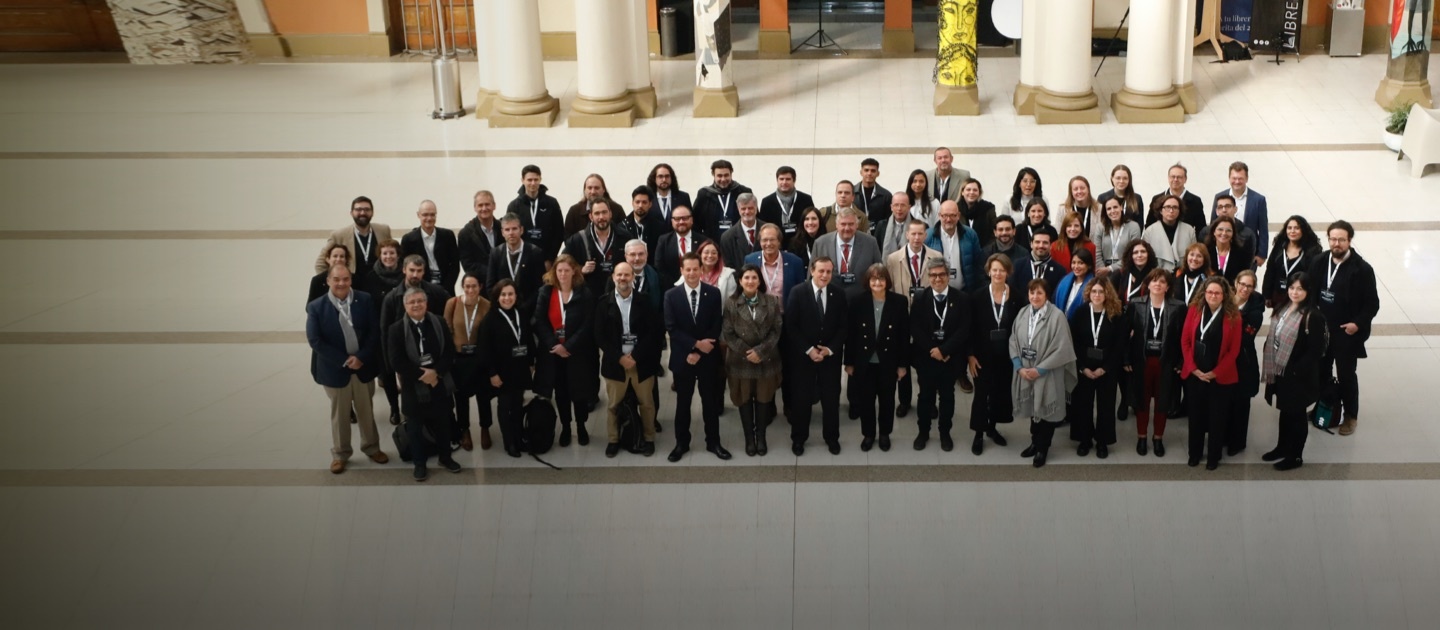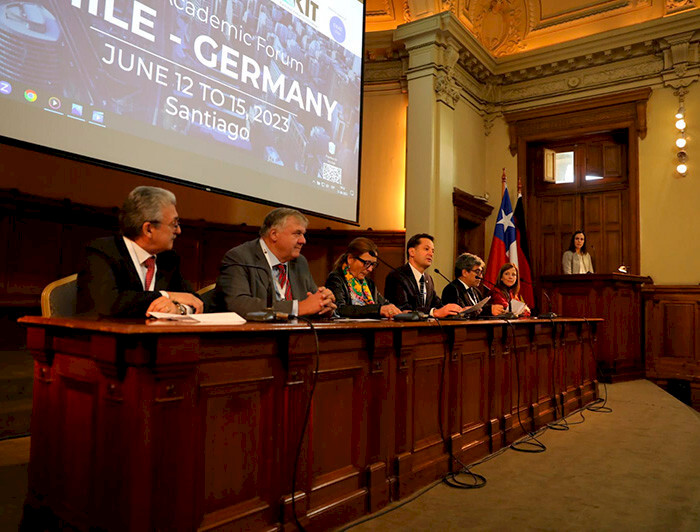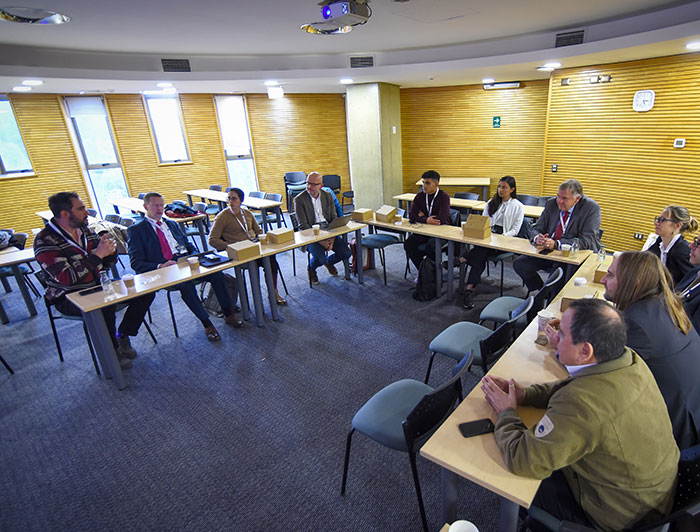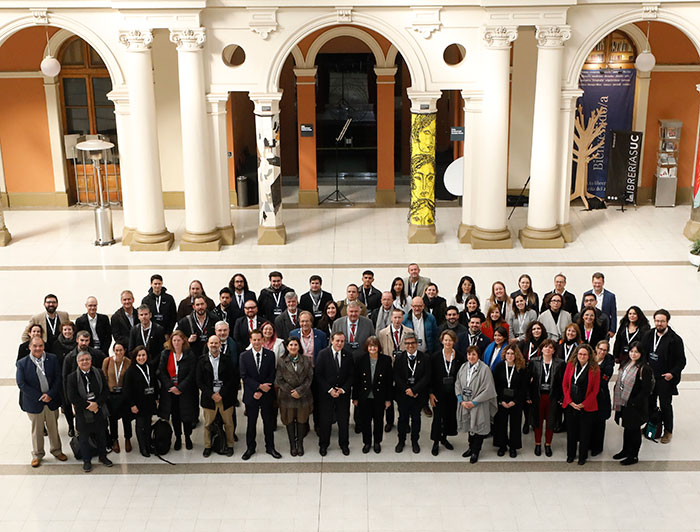
Sustainable Development Promotes the First Chile-Germany Academic Forum
Experts from seven universities from both countries, including UC Chile, gathered at the first Chile-Germany Academic Forum. This event is built upon a historic scientific collaboration between the two countries, aiming to enhance these ties and generate new cooperation. It includes young and senior researchers, fostering relationships with industry.

photo_camera The main objective of the first Chile-Germany Academic Forum is to strengthen international academic cooperation among higher education institutions through a collective discussion involving academia, industry, and governments from both countries. (Photo credit: UC Chile Communications)
Interdisciplinary Perspectives on Renewable Energy and Productive Transformation, Climate Change, Territoriality, and Sustainable Governance for Green Transition, and Circular Economy were the topics addressed by the three working groups that were established during the first Chile-Germany Academic Forum. The event took place in Santiago between June 12th and 14th, with venues at Universidad Católica, Universidad de Concepción, and Universidad de Chile.
The organizing consortium of the Forum comprises these Chilean universities, while the German side was represented by the University of Heidelberg, the Technical University of Berlin, the University of Hamburg and the Karlsruhe Institute of Technology. The initiative also involved important strategic partners, including the German Academic Exchange Service (DAAD Chile), the Embassy of Germany in Chile, the Chilean Ministry of Foreign Affairs, the Council of Rectors of Chilean Universities and the Chilean-German Chamber of Commerce and Industry.
The Chile-Germany Forum aims to strengthen international academic cooperation among higher education institutions through a joint discussion involving academia, industry, and governments from both countries. This is done to promote green growth and recovery, thereby fostering sustainable development in both countries.
Ignacio Sánchez, the President of Pontificia Universidad Católica de Chile, emphasized the commitment of the participating institutions in driving the Chile-Germany Academic Forum forward. "Tackling global and complex challenges like sustainability requires deep, genuine, and coordinated collaboration that leverages our diverse strengths, resources, and perspectives. This forum can demonstrate that through knowledge exchange and collective effort, we can propose concrete and innovative solutions to issues we face in Chile, our region, and the world."
Rosa Devés, President of Universidad de Chile, emphasized the commitment fostered in this Forum through collaboration and the expansion of knowledge boundaries to address global challenges. "We see this event as a catalyst for establishing a strong and lasting cooperation between the academic communities of both countries. Solutions firmly grounded in science and knowledge are crucial and require our urgent attention."
Similarly, Andrea Rodríguez, the Vice President for Research and Development at Universidad de Concepción, said they hoped their participation in the forum would encourage new faculty to engage in an international collaboration network with Germany. They firmly believe that the internationalization of their work strengthens knowledge development and facilitates interaction with new opportunities that arise.
Adding to the previous statements, Dr. Inés Recio, the Executive Academic Director of the Heidelberg Center for Latin America at the University of Heidelberg, highlighted the efforts of the working groups during the inaugural edition of the forum. "It has served to bring people and participating institutions closer together, clearly demonstrating the strong interest that both German- and Chilean-made science have in jointly addressing the climate crisis," stated Dra. Recio. She emphasized the importance of recognizing the potential of this exchange and the vital need to continue the efforts.
International Collaboration for Sustainable Development
The event was structured around three thematic work committees, which provided a space for reflection and dialogue among participants, fostering the identification of actions and solutions to move towards a more sustainable future:
- "Interdisciplinary Perspectives on Renewable Energies and Productive Transformation" focused on analyzing the importance of renewable energies and their impact on the productive transformation of countries.
- "Climate Change, Territoriality, and Sustainable Governance for the Green Transition" explored strategies and challenges in climate change management and the implementation of sustainable practices at a territorial level.
- "Circular Economy, Productive Models, and Consumer Culture for Sustainability" aimed to examine the need to adopt productive models based on a circular economy and promote a culture of responsible consumption as fundamental pillars of sustainability.
The results of the work carried out by the three working groups highlighted the fundamental importance of enhancing the active role of academia in addressing the diverse challenges posed by sustainable development. This entails considering the differences that exist in each territory and the various perspectives that emerge from each discipline. As a result, both the participating researchers and the authorities of the organizing universities concluded the event with high expectations of realizing future scientific collaborations, eagerly anticipating the next edition of this academic gathering.
During the closing session, UC Chile Vice President for Research Pedro Bouchon, issued a call to action, urging all attendees to "spread the message of this meeting to their respective institutions and communities, involving and motivating them to participate in future versions, as well as promoting further research, fostering sustainable practices, and driving positive change.”
Maria Inés Picazo, the Director of International Relations at the Universidad de Concepción (UdeC, as per its spanish acronym), described the meeting as "a space of opportunities to generate new alliances among the researchers from the seven participating universities, strengthen existing working groups, and project the work of UdeC alongside German universities."
On the other hand, Enrique Aliste, the Vice President for Research and Development at Universidad de Chile, emphasized the importance of addressing these topics towards sustainable development through scientific collaboration. He stated that this forum is "a valuable opportunity to achieve our objectives for an equitable and prosperous future for current and future generations, through dialogue and scientific and academic reciprocity that this platform provides us."
In conclusion, Diego Rivera, the Academic Coordinator of the Master's in Risk and Resource Governance at the Heidelberg Center for Latin America mentioned that both countries have a horizontal academic relationship, with common needs and valuable experiences that allow them to learn from each other. “This inaugural forum has played a vital role in establishing the foundations for academic collaboration in strategic areas with a global scope,” said the professor.
UC Chile Participation

Universidad Católica was in charge of leading the group that addressed renewable energies, through the participation of Kay Bergamini, a faculty member from the Institute of Urban Studies. During the working group, the main challenges in the field of renewable energies were discussed, considering technical, territorial, social, environmental, and market aspects. The group was joined by industry professionals, with a particular focus on green hydrogen, exploring potential opportunities for collaborative efforts. Additionally, the group had a meeting with a representative from the Ministry of Energy.
Thanks to this meeting, faculty from the German universities will visit a green hydrogen pilot plant in Punta Arenas to learn about the development of this energy in Chile.
"One of the key findings from the group is the strong foundation of trust between Chilean and German academics, enabling swift collaboration," commented Kay Bergamini. “Energy transitions, especially in the green hydrogen industry, are a relevant topic for both countries and have significant potential for collaboration."
The group of researchers aims to continue cooperating in this field of study and emphasized the need for concrete actions to generate an impact from their contribution, as well as the necessity of funding for research development.
As explained by Lilian Ferrer, the Vice President for International Affairs at UC Chile, the purpose of this initiative is to "strengthen international academic cooperation between higher education institutions from both territories; promote joint work for innovation that allows for the development and transfer of technologies; increase cooperation between academia, industry, and both governments; and expand opportunities for young researchers' academic development."
"Academic collaboration plays a vital role in promoting sustainability," said María Elena Boisier, the Director of Research at the Office of the Research Vice President at UC Chile. "Clean energies, responsible territorial governance, and a new approach to production and consumption are key areas in this shared path. These are just a few initial insights into the infinite complexity addressed in the first edition of this bilateral forum. Certainly, in the near future, it will require the involvement of a broader thematic and disciplinary horizon, including the arts and humanities."
Projections

The international cooperation initiative aims to establish long-term collaboration among the participating groups, with the next edition of this event scheduled to take place in Germany in 2024.
According to Professor Bergamini, the chance to engage with professors from various fields and perspectives, including chemical engineering, electrical engineering, geography, and more, fosters a wide-ranging and fruitful dialogue that involves everyone. This demonstrates the comprehensive nature of challenges and their impact on territories and society. It also enables "identifying common issues between both countries, as well as recognizing and learning from our differences in order to build knowledge," said Bergamini.
The objective is for this collaboration to continue and grow, promoting an ongoing exchange of knowledge and experiences among the various stakeholders involved. Looking ahead, next year's event will provide a chance to build on the progress made so far and further enhance international cooperation for the advancement of sustainability and joint development.


